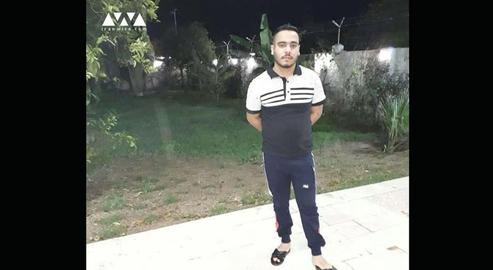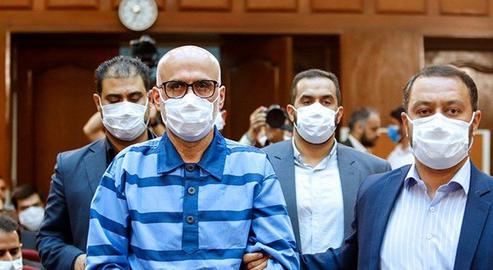In the middle of the night on Sunday, June 14, Habib Barhi, a 30-year-old resident of Abadan in southwestern Iran, walked into Valiasr police station and confessed that he had killed his 19-year-old cousin, whom he had married a year earlier. He produced the murder weapon, a bloodied knife, and handed it over to police.
The officers at Station 11, guided by Bargi, made their way to the Bahar 56 area on the banks of the Shat: the name given by locals to the Bahmanshir River. There, under one of the palm trees that fringe the water, was Fatemeh Barhi: sunk in her own blood in the darkness, her throat mercilessly cut through.
Fatemeh Barhi was a delicate and attractive girl who had seen only 19 springs. Writers in cyberspace claim that she had been rescued from a brutal death by her mother several times before.
Young Women Forced to Marry Cousins as a Matter of Course
Local resident Adnan Shamayeli, who owns a small children’s clothing store in Valiasr Alley, said he had known nothing of the incident until a police car and forensic pathologist arrived on the scene to take Fatemeh’s body away.
He watched this happen and describes the catastrophic condition of Fatemeh's decapitated body. Her head, he says, was completely cut off with a sharp object: surely this brutal act could not have come been committed by a young man acting alone.
Shamayeli told IranWire that according to tradition, many people – particularly those belonging to tribes and clans - consider a girl’s first and most straightforward option in life to be marrying her cousin.
"Sometimes this cousin may not be suitable, and he may even be married and have several children,” says Adnan, who refused to marry a cousin himself and now has a wife from Kerman.
“But if the cousin wants the girl, the family have no right to give the girl to a stranger. It doesn't matter if that girl has a good life or not; [whether she] gives her consent or not. These issues have no importance whatsoever."
It is understood that Fatemeh's sister was also unwillingly married off to a cousin. On being sent to her uncle's house, which was to become her new home, this discontent led to violence and fights, and conflicts, and Fatemeh's sister returned home every day with bruises.
Shamayeli says Fatemeh was also upset with her uncle, hated him and insisted that she was not happy with the marriage. But as the girl's consent was not a condition, she had to surrender to the men of the family and their decision.
“If they refuse to marry,” Shamayeli says, “they will be considered rebellious: women who are irreputable and ignoble."
One of Fatemeh's relatives, who did not want to be named, has spoken to sociologist and women’s rights activist Eli Khorsandfar in recent days. The account that she gave seemed to match that of Adnan Shamayeli.
It seems Fatemeh did not want to suffer the fate of her sister. After her marriage to Habib Bahri, she escaped from home with the help of a friend and took refuge in the city of Mashhad at a safe house.
Her father, however, was able to convince her to come home. With her father’s appeasement, and the growing resentment of her cousin, Fatemah instead became the victim of this attempted flight.
Honor Killings: Innocent Girls Murdered in Sick Value System
Honor killings have already taken place in the family. Fatemeh's aunt, who had filed for divorce several years ago due to her husband's addiction, was killed with the collusion of her brothers and husband because her divorce petition was considered a familial disgrace and a sign of her “indecency”.
Katayoun Nakhaei, a social worker and advisor to a government agency in Khuzestan province, told IranWire that femicide in the area is common. When a woman is under suspicion, she says, nothing – not being the mother of several children, nor being kind, or anything else – is important. “She must be killed, and only killing her will remove the stigma from her family."
Nakhaei recalls a case she was involved in in 2009, near Sar Bandar. "The father and three brothers of a very beautiful 18-year-old woman, who suspected that she could not satisfy her husband, stormed the daughter's house at midnight. She was taken to Sar Bandar Cemetery in her nightgown and buried alive in a grave, and covered with cement. It was such a scary and sickening case that I still can't forget the details."
In Nakhaei’s assessment there is no such thing as law in the minds of such people, and Iranian law itself does not provide much protection for the would-be victim. It also does not guarantee a significant punishment for murderers who commit crimes in the name of honor. As the killer man has no private complainant, after a while, he is safe to proudly return to the neighborhood. “They also use the word 'betrayal' to incite public hatred towards the wife," Nakhaei explains.
Nakhaei has studied many cases of honor killings in Khuzestan down the years, and says girls who suffer the same fate as Fatemeh. One she recalls is a 17-year-old girl called Leila, who died in 2017 in Mahshahr after being viciously attacked by her brother.
"She had a suitor,” Nakhaei says. “The people in the house were happy with him. It seems that all the conditions of the were met: he had a good job, both in terms of position and social status. When the suitors left, Leila said with embarassment that she did not want him.
“Those who were happily chatting about it were surprised, and looked at her. Her brother immediately asked Leila why. ‘Do you love someone else?’ they asked. Leila answered with shame: ‘Yes’. And at that moment his brother hit Leila on the chest and banged her head on the mosaic tiles on the floor of the courtyard. Before the second blow came down, Leila's head bent to one side and the poor girl stopped breathing.”
Another innocent 17-year-old girl, Narges Ali Shojaei, was also a victim of honor killing in Khuzestan. She was punched and kicked and finally shot dead by three bullets from her brother’s gun, in the town of Tashan, Behbahan.
This, like Fatemah’s murder, came about because Naeges did not want to be forced into marriage with her cousin. Narges's mother and brothers put pressure on her to marry him. Finally on 3 July 3 2017 finally, after enduring the forced marriage because of their insistence, Narges cut the veins of both her wrists with the intention of committing suicide. But her family took her to Shahidzadeh Hospital in Behbahan in time, and nurses in the emergency department worked hard to save her life. Narges told the ward nurse that if she was discharged, she would attempt suicide again.
“Her family made promises, if they discharged the poor young girl from hospital ahead of schedule, to provide adequate care. But in practice they had a deep hatred for the girl, who had risked their ‘reputation’ by committing suicide and refusing to marry.
“That same night, Narges's half-dead and wounded body was crushed under her brother's fists and feet. Her body would be taken to the morgue this time. There was not much left of her; her face was shattered by three G3 rifle bullets.”
No Hope for Justice
The murder of Fatemeh will be neither the first nor the last. As the law is seriously weak in this area, there is little hope of the killer being punished.
The commander of Abadan’s police force, Colonel Taghizadeh, said Habib Barhi had been arrested on suspicion of murder and was under investigation.
But according to Qisas – the arcane “law of retribution” that runs straight through Iran’s penal code – the Qisas law the relatives of the murdered person are the only ones who can demand prosecution. Because in this case the relatives are the murderers, Barhi will not be prosecuted and after a light prison sentence for the crime committed in public, he will in all likelihood be able to resume a normal life.
visit the accountability section
In this section of Iran Wire, you can contact the officials and launch your campaign for various problems


























comments